What are the main problems related to heat?
Exposure to periods of intense heat, particularly for several consecutive days – hot flashes – is an assault on the body and may require emergency medical care.
Extreme situations of exposure to intense heat can cause serious health complications, sometimes irreversible. The main problems are:
- severe dehydration
- Cramps
- worsening of chronic diseases
- heat exhaustion
- sunstroke
- death

What are the additional protective measures on days of high temperatures?
Protective measures in the event of high temperatures are intended to prevent complications caused by exposure to heat. Indeed, it is recommended to:
- Seek cool and airy environments
- drink water or natural juices regularly and even if you are not thirsty
- Avoid the consumption of hot, alcoholic, carbonated, caffeinated and sugar-rich beverages
- Avoid direct exposure to the sun during the hottest hours, particularly between 11 a.m. and 5 p.m
- Apply sunscreen with a factor of 30 or higher every 2 hours
- Wear light, loose, light-colored clothing, preferably cotton, and wear a hat and sunglasses
- avoid activities that require great physical effort, such as sports or outdoor leisure activities
- Do not stay inside parked vehicles exposed to the sun
- eat light meals and eat more times a day
- pay special attention to the groups of people most vulnerable to heat
Who are the most vulnerable to heat?
Some people are more vulnerable to the effects of intense heat and require special attention and specific measures to be protected, such as:
- Children in the first years of life
- people aged 65 and over
- People with chronic diseases
- People who work outdoors, exposed to the sun and/or heat
- Practitioners of physical activity
- people who are isolated and in economic and social need
What care should be taken with babies?
Babies and young children are especially sensitive to the effects of intense heat and depend on adults to stay safe. You should protect them from intense heat with the following measures:
- Dress in light, loose, light-colored clothing
- Don't forget your hat when you're outdoors
- Give water more often and make sure you drink more water than usual
- Avoid direct exposure to the sun, especially between 11 a.m. and 5 p.m
- Apply sunscreen before leaving the house
- Never leave your baby/child in a parked car or other place exposed to the sun, even for a short time
You should contact SNS 24 – 808242424 – or seek medical assistance immediately whenever you identify warning signs such as:
- Heavy sweating
- weakness
- cold, sticky, pale skin
- rapid or weak pulse rate
- vomiting or nausea
- fainting
- diarrhea
- fever
What precautions should I take if I am 65 or older?
Everyone over the age of 65 should take into account the following recommendations:
- Drink water, even when you're not thirsty
- Stay in cool or air-conditioned environments
- Avoid direct sun exposure
- Wear light, loose, light-colored clothing and the use of a hat and sunscreen
- Eat lighter meals and eat more often a day
- Have the contact of someone attentive and available (relative, friend, neighbor)
Consult your doctor if you have a chronic illness or if you are on a low-salt or fluid-restricted diet.
What precautions should I take if I have a chronic disease?
Unless medically indicated, you should:
- Drink water, even if you don't feel thirsty
- stay in cool or air-conditioned environments
- Avoid direct exposure to the sun
- Wear light, loose, light-colored clothing and wear a hat and sunscreen
- Wear less linen in bed, especially people with poor mobility or are bedridden
- have someone attentive and available (family member, friend, neighbor)
If you have any signs or symptoms associated with heat, contact SNS 24 – 808242424 – or seek medical attention immediately. You should also avoid exposing medicines to high temperatures.
What are the precautions to be taken for people working abroad?
For people who maintain activities abroad, it is recommended:
- Drink water frequently
- Avoid consuming liquids with a lot of sugar and alcoholic beverages
- Wear light equipment and sunscreen as long as it is possible and safe
- During breaks, take the opportunity to cool down, if possible in air-conditioned places
- Try to develop your activity with other colleagues around
What are the recommendations for those who practice physical activity?
- Start and end physical activity slowly and gradually: opt for early morning or late in the day and avoid the hours of greatest sun exposure, between 11 am and 5 pm
- Drink water often: before, during, and at the end of physical activity. If you sweat a lot, opt for an electrolyte drink (drinks for athletes)
- Avoid consuming liquids with a lot of sugar
- Perform physical activity with company
- Immediately stop the activity if you feel weak or faint
What is the precaution for isolated people?
Isolated people should contact or be contacted periodically (at least 2 times a day) to find out about their health status. In addition, find out about the weather conditions and climate-controlled places.
Source: Directorate-General for Health (DGS)